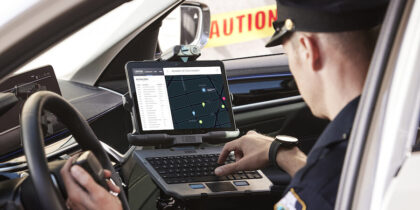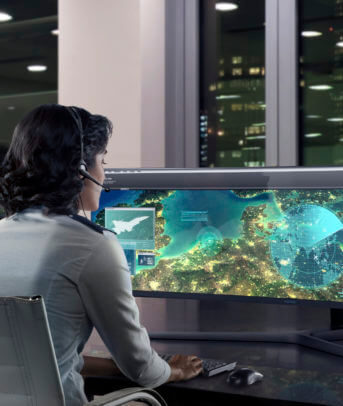| Federal government mandates are changing how public employees work by using workplace technology to emphasize flexible workplaces where working from home, on the go and in satellite offices is permitted. These policies reduce emissions through shorter or eliminated commutes, improve citizen customer experiences and encourage greater work/life balances.
In a recent Frost & Sullivan research survey of more than 500 U.S. businesses, schools and government agencies, only 45 percent of employees regularly work in a traditional office. To meet these demands, advanced workplace technology is being used and it is changing the way employees get work done. However, security is a vital priority. While there are obvious benefits to mobile work environments, mobile devices and remote workspaces can also lead to increased information security risks. Developing an appropriate mobile security program is a critical first step.
Samsung Knox delivers a robust workspace container that secures and cordons off government enterprise applications from malicious attacks and data leakage. The integrity of agency data is protected on the device. When citizen-facing work is involved, federal employees can use tablets to expedite paperwork processing times. In one scenario, TSA pre-check centers use tablets to speed the process of filling out forms and collecting payments. With a tablet in hand, employees can begin the process with customers as they wait in line, thus creating shorter wait times for everyone involved. Tablets and other mobile devices can aid field employees at regulatory agencies, such as the Environmental Protection Agency, Centers for Disease Control and Protection, the Census Bureau and Department of Homeland Security. With secure, remote access to back-office programs and data, employees can leverage case information, government requirements and regulations and reports in real-time. Knox security provides kernel monitoring to detect unauthorized modifications that could prevent malicious attacks. It can also prevent rooted devices from accessing agency resources, while using TrustZone to provide hardware-backed storage for cryptography keys and client certificates.The first step in security is identifying how employees intend to use their mobile devices – from business apps to connectivity. All-in-one mobile solutions do not always deliver the best results, rather it is about choosing the right solution for the user base. At the end of the day, government decision-makers need the right mobile business technology to unlock greater productivity for their remote workforces, while ensure data security remains top priority. |
![Tablets Are Transforming the Way Government Works [White Paper]](https://s47295.pcdn.co/wp-content/uploads/2015/03/millitary-scaled.jpg)






